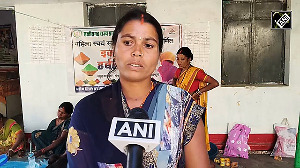The governor of a state neighbouring Tamil Nadu has been closely observing goings-on in Chennai. He said he thought the new government that will come to power in Chennai in this year's assembly election would face tough going because it would find the treasury almost empty. He was not exaggerating. The Election Commission has announced that assembly elections in Tamil Nadu must be completed before May 21. April is probably when the election will take place. This means Chief Minister J Jayalalithaa has until mid-March to distribute largesse to help voters think about voting for her. That's exactly what she is doing. At considerable cost to the exchequer.
In January 2006 alone, consider all the freebies announced by the 'hon'ble chief minister' (that's how Tamil Nadu bureaucrats refer to Jayalalithaa, even when she is not present: To wit '... and then we told the hon'ble chief minister to take a walk because it was not possible to do what she was asking'. This is a sample of a real conversation this writer had with a TN bureaucrat during the days of the tsunami).
On January 8 the chief minister announced the government would build a bridge near Srirangam across a tributary of the Cauvery. The cost? Rs 34 crore. On January 9 she visited her constituency, Andipatti. She laid the foundation stones of civil works for 2,144 projects (why the repair of a broken culvert, for instance, should merit a foundation stone is a mystery, but then this is Tamil Nadu and Jayalalithaa we're talking about). The cost? Rs 105.83 crore. She also announced on the spot cash relief for 16,600 families worth Rs 6 crore. That's serious money to spend in one afternoon.
Earlier she had announced an interest waiver package for farmers who had taken loans from co-operatives. The cost? Rs 135 crore. On January 12 she announced a free sari-and-dhoti programme worth Rs 256 crore to be given to 3.28 lakh people. The ostensible reason was Pongal. In which case why was the programme designed to continue into mid-March? On the same day, she announced a Rs 14-crore per annum package for workers in sugar mills from the co-operative and government sector. The workers must have been in shock. On January 3, they had threatened to go on strike protesting against the delay in wage settlement pending since 2003. And within a week of their threat, the CM complies with their demand and much, much more! The wage package will be in force for five years and arrears ranging from Rs 800 to 20,000 from April 2005 are to be paid in cash!
Cash plays a big part in relief efforts, whether for the recent floods or the tsunami. Relief for the December floods involves a package of one sari, one dhoti, 10 kg rice, one litre kerosene and Rs 2,000 in cash. Guidelines for relief have been relaxed. So whether you have been affected by floods or not, you need only to fill up a form and you can trot up to the collector's office and collect your Rs 2,000. Rs 566 crore has been sanctioned for the scheme. Where it will go is anybody's guess. It's all cash, you see.
The government has also increased dearness allowance for state employees and pensioners from 67 per cent of the basic pay, to 71 per cent, effective January 1, 2006. This involves an additional cost of Rs 282 crore per annum.
Money alone doesn't win elections. In a controversial decision, the government scrapped the common entrance test for admission to undergraduate professional courses in June 2005, because the test had become 'a burden' and a 'traumatic experience'. However, the Supreme Court intervened and the government was told it could scrap the test only for colleges run by the state government and not private colleges. As government-run colleges offer only about 2,000 seats as opposed to 9,000 seats in engineering and medical colleges for which one lakh children compete, and the new academic year begins in March-April, there was confusion. Now, bypassing the Supreme Court, the government has decided that those students covered by the Tamil Nadu Education Board can seek entrance on the basis of the marks they've got in Class 11 and 12. Candidates from all other boards will have to take a common entrance test. The Opposition had demanded the CET be scrapped for all. Catch Jayalalithaa giving in to any demand of the Opposition! The students and their parents (who're the voters) are thrilled. That's one exam less for them to take.
Against this background, it would appear that Jayalalithaa is set to return to office in Tamil Nadu. After the 2004 Lok Sabha debacle when her party won zero seats, she rolled back all the controversial decisions her government had taken -- anti-conversion law, banning animal sacrifice in temples and so on -- and began consolidating. Everything is helping her -- ranging from the decision to regularise all urban colonies that have sprung up after 1988, to the Congress announcement recently that it foresaw a coalition government coming to power in Tamil Nadu. This means the opposition alliance will not be as seamless as it was in the Lok Sabha election.
Out of a total of 234 seats in the Tamil Nadu assembly, the biggest opposition party, the Dravida Munnetra Kazhagam, needs to reach the 118-mark if it has to form a government. So, it must contest 140-150 seats on its own. This means leaving 90 to 100 for the allies. S Ramdoss of the Pattali Makkal Katchi has already declared that his party is better and bigger than the Congress. So multi-cornered fights are going to be the order of the day in the assembly elections. In that scenario, local issues are going to dominate. Jayalalithaa has already started her election campaign. The Democratic People's Alliance is going to launch its campaign on January 18. Get ready for a 'think local, act local' election.







 © 2025
© 2025